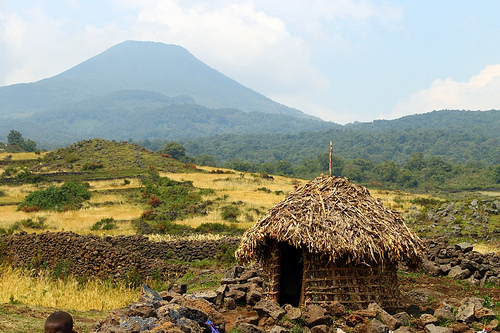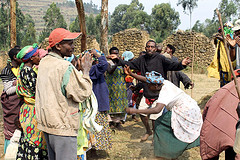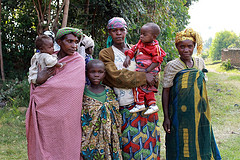Phase 4 of the Singing Wells project starts next month with a field visit to the Kisoro district of Uganda to record the music and dance of the Batwa people.
The Batwa, historically a nomadic, forest dwelling community of hunter-gatherers, are widely acknowledged to have been the first human residents of the forest areas which stretch across much of what is now Uganda, Rwanda, Burundi and DRC. In recent history however, the Batwa have become a displaced and largely forgotten ethnic group and their traditional culture and way of life is threatened with extinction.
The Batwa community first became fragmented as other ethnic groups populated their homelands, cutting back the forest to provide land for crops and livestock. However, it was in 1991, with the creation of formal conservation areas outlawing all human activity in the forests surrounding the Virunga mountains, when everything changed for the Ugandan Bawta. Unable to live and hunt in the forest, the Batwa were forced to live in areas not suited to their traditional way of life. They became largely excluded from Ugandan society. Batwa communities suffered from poverty and exclusion and were offered little stake in the tourist industry which has developed in forests where they once lived.
The plight of the Batwa in Uganda is now being recognized and there are initiatives in place to support their communities and help them reclaim their traditional way of life. The United Organisation for Bawta Development (UOBDU) was founded in 2000 to address land problems and develop sustainable livelihoods. UOBDU has identified four key areas of support: land & housing; education and adult literacy; income generation and forest access & benefit-sharing. By way of example, the Batwa Cultural Trail is a new initiative launched by the Uganda Wildlife Authority and UOBDU. The trail will provide an income for Batwa and it is the first initiative to afford them a stake in the conservation and management of the National Park which was once their home.
The Batwa love to sing and dance, and often do so spontaneously. The Batwa in these photos are from the Nyakabande region near Kisoro, Uganda. The photos were taken in July, 2011 by Dina Buck for the United Organsation for Batwa Development in Uganda.
Rationale for taking the Singing Wells project to Kisoro, Uganda
The overall aim of the Singing Wells project is to identify, record, preserve and promote the cultural music heritage of East Africa. In taking the project to Uganda to document and record the traditional music and dance of the Batwa, we can help to stem the tide which is threatening to obscure the music traditions of this ethnic group. The SWP will ensure that the unique sights and sounds of the Batwa are fully and professionally documented, preserved for the future and promoted to a wide audience through all media platforms. We also intend that the SWP will provide a positive and lasting benefit for the whole Batwa community. The immediate benefit will be a source of new income as each of the music groups will receive a gratuity payment for their performances. The lasting benefit will be the preservation, awareness and appreciation of the Batwa people and their cultural music heritage. The SWP will literally put the Batwa back on the map as we add their music and dance to the ‘Discover the Music’ map on the Singing Wells website. We will make the recordings available to other NGOs and ethnomusicologists and we hope this will, in time, provide new opportunities and sources of income for the Batwa. In planning our visit, we have worked closely with UOBDU and the Forest Peoples Programme to ensure that the Bawta community receive the maximum benefit from the Singing Wells project.



